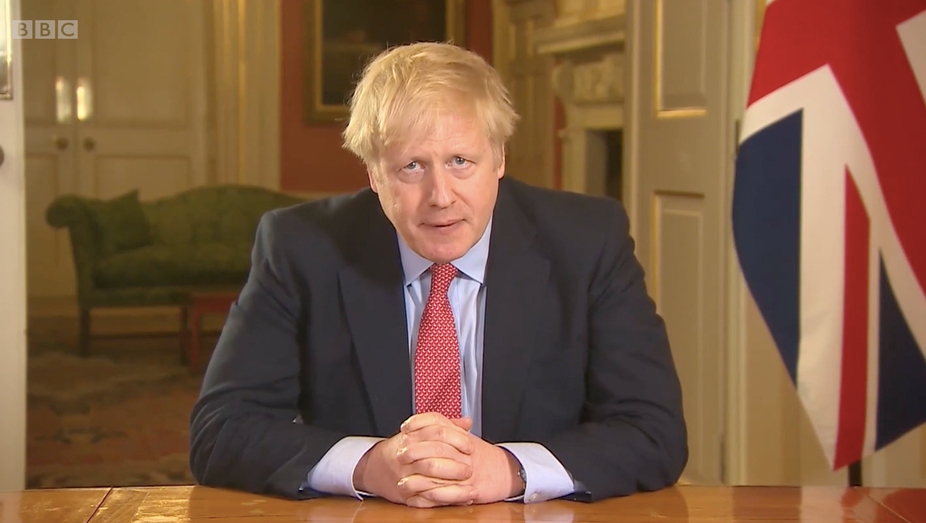Boris Johnson chose a “day of rest” - Sunday May 10 2020 - to broadcast to UK citizens about the government’s plans for the next stage in its COVID-19 measures. The broadcast comes days after announcements by Angela Merkel in Germany and Emmanuel Macron in Franceof their plans to rollback lockdown.
Why choose Sunday? Johnson attempted to explain why in the most recent Prime Minister’s Questions on Wednesday May 6, when he said:
The reason is very simple. We have to be sure that the data is going to support our ability to do this (coming out of lockdown), but that data is coming in continuously over the next few days.
We will want, if we possibly can, to get going with some of these measures on Monday, and I think it will be a good thing if people have an idea of what is coming the following day.
That is why I think Sunday – the weekend – is the best time to do it, but of course the House will be fully informed and will have the full opportunity to debate and interrogate me or the Government on that matter.
This doesn’t answer the question fully. If a bit more time were needed, why not choose Monday for example? If organisations are literally meant to start on Monday, isn’t Sunday a bit too close?
Why Sunday
For the government a Sunday announcement has several advantages, many of them to do with the news agenda. As a general rule, there is less news on a Sunday and so fewer events to fight with for attention. Making an announcement directly to the public also removes some of the immediate opportunities for opposition politicians to negatively comment on any changes.
But the televised address is just part of the communications package. It is normal for governments, and for that matter oppositions, to selectively brief the press with aspects of a statement or a launch early to get Sunday newspaper front pages. And, as first editions prepared on Saturday evening, that means the Johnson speech can be just one part of a larger communications exercise with messaging throughout the 24-hour news cycle and critics struggling to catch up.
While televised government press conferences and direct addresses by the prime minister are relatively rare in this country (outside the controlled mechanisms of election broadcasts) they are more common elsewhere.
In the US, for example, Franklin D. Roosevelt’s “fireside chats” morphed into a weekly radio address, a tradition continued by many presidents. George Bush, for example, introduced a podcast, while Barack Obama used a weekly video address during his presidential transition period. Donald Trump continued the weekly address via video for the first nine months of his administration, then put it on hiatus.
Here though, the concept of the UK prime minister speaking directly to the nation is less usual and so carries more weight.
Crisis comms
Generally prime ministerial addresses come at times of crisis or highly significant news. They are there to tell us we are “at war with Germany” or that the war with Iraq was starting. Theresa May’s televised address in 2019, ahead of requesting a Brexit extension, was widely seen as misguided – but it is clear she felt she needed to appeal to an audience outside the Commons.
The government’s need to communicate – and the volume of questions coming from all sides – has led to the daily televised press conference, which is an odd mix of direct address, with speakers talking to camera using visual aids, and interactions with journalists.
This in turn has sparked a subset of comments, including those from former Blair communications chief Alastair Campbell and TV presenter and former tabloid editor Piers Morgan, on style, content and delivery. This may lead in turn to pressure to make the “peacetime” Downing Street briefings more visible.
At the moment these are rather behind closed doors and one of them – in pre-COVID times – was even referred to by journalists as the “huddle”. Of course journalists in the lobby (effectively a self-policing group who get special access) have an interest in opportunities beyond the camera’s gaze.
Johnson has a difficult tightrope to walk. His natural presenting style is ebullient and often slips into humour. But these are dark times which call for a serious approach which informs rather than confuses.
His announcements won’t be news for many groups. We already know that draft plans have been circulating business and trade union organisations. And that there have been conversations about what might be possible.
Many organisations will already have been given advance information. So Johnson’s main task is to convince the rest of us and to answer some of those hanging questions about school re-openings, shops, workplaces and travel.



 Netanyahu to Meet Trump in Washington as Iran Nuclear Talks Intensify
Netanyahu to Meet Trump in Washington as Iran Nuclear Talks Intensify  Trump Allows Commercial Fishing in Protected New England Waters
Trump Allows Commercial Fishing in Protected New England Waters  China Warns US Arms Sales to Taiwan Could Disrupt Trump’s Planned Visit
China Warns US Arms Sales to Taiwan Could Disrupt Trump’s Planned Visit  U.S.-India Trade Framework Signals Major Shift in Tariffs, Energy, and Supply Chains
U.S.-India Trade Framework Signals Major Shift in Tariffs, Energy, and Supply Chains  Trump Says “Very Good Talks” Underway on Russia-Ukraine War as Peace Efforts Continue
Trump Says “Very Good Talks” Underway on Russia-Ukraine War as Peace Efforts Continue  U.S. Announces Additional $6 Million in Humanitarian Aid to Cuba Amid Oil Sanctions and Fuel Shortages
U.S. Announces Additional $6 Million in Humanitarian Aid to Cuba Amid Oil Sanctions and Fuel Shortages  Ohio Man Indicted for Alleged Threat Against Vice President JD Vance, Faces Additional Federal Charges
Ohio Man Indicted for Alleged Threat Against Vice President JD Vance, Faces Additional Federal Charges  India–U.S. Interim Trade Pact Cuts Auto Tariffs but Leaves Tesla Out
India–U.S. Interim Trade Pact Cuts Auto Tariffs but Leaves Tesla Out  South Korea Assures U.S. on Trade Deal Commitments Amid Tariff Concerns
South Korea Assures U.S. on Trade Deal Commitments Amid Tariff Concerns  Norway Opens Corruption Probe Into Former PM and Nobel Committee Chair Thorbjoern Jagland Over Epstein Links
Norway Opens Corruption Probe Into Former PM and Nobel Committee Chair Thorbjoern Jagland Over Epstein Links  Trump’s Inflation Claims Clash With Voters’ Cost-of-Living Reality
Trump’s Inflation Claims Clash With Voters’ Cost-of-Living Reality  Trump Allegedly Sought Airport, Penn Station Renaming in Exchange for Hudson River Tunnel Funding
Trump Allegedly Sought Airport, Penn Station Renaming in Exchange for Hudson River Tunnel Funding  Trump Signs “America First Arms Transfer Strategy” to Prioritize U.S. Weapons Sales
Trump Signs “America First Arms Transfer Strategy” to Prioritize U.S. Weapons Sales  Japan Election 2026: Sanae Takaichi Poised for Landslide Win Despite Record Snowfall
Japan Election 2026: Sanae Takaichi Poised for Landslide Win Despite Record Snowfall  TrumpRx.gov Highlights GLP-1 Drug Discounts but Offers Limited Savings for Most Americans
TrumpRx.gov Highlights GLP-1 Drug Discounts but Offers Limited Savings for Most Americans  Trump Backs Nexstar–Tegna Merger Amid Shifting U.S. Media Landscape
Trump Backs Nexstar–Tegna Merger Amid Shifting U.S. Media Landscape  U.S. to Begin Paying UN Dues as Financial Crisis Spurs Push for Reforms
U.S. to Begin Paying UN Dues as Financial Crisis Spurs Push for Reforms 
































